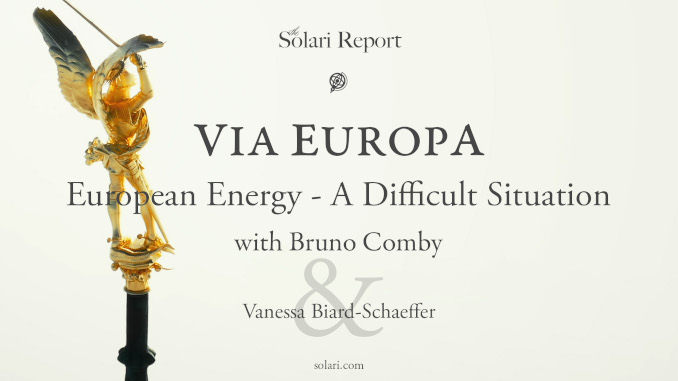
“The opposition of the environmental movement to civilian applications of nuclear energy will in time be revealed as among the greatest mistakes of our times.”
~ Bruno Comby, October 2002
“[T]echnology has now progressed to the point where the fear-mongering being spread by anti-nuclear activists about the safety of nuclear energy bears no resemblance to reality.”
~ Dr. Patrick Moore, PhD, Greenpeace co-founder
By Vanessa Biard-Schaeffer
This week in Solari’s Via Europa series, I share a timely conversation with French nuclear physicist, author, and energy visionary Bruno Comby about European energy needs and the consequences Europe is facing as a result of the war in Ukraine.
By training, Comby is an engineer—a graduate of France’s prestigious Ecole Polytechnique and a nuclear physics postgraduate of Paris’s Ecole Nationale Supérieure des Techniques Avancées (National University of Advanced Technology). With a father who was himself a geologist and engineer working overseas for a French oil company, Comby spent time as a child in both Africa and North America.
A writer and lecturer of international renown in the fields of energy, health, and the environment, Comby is the founder of Environmentalists for Nuclear Energy (since 1996) and author of a book by the same name (translated into 15 languages) as well as nine other books. He is also the scientific director of the institute that bears his name (Institut Bruno Comby), within which he coordinates a team of scientists and doctors who carry out preventive health research, and founder of the Optimist Movement. He has been described as “the godfather of environmentalists who support nuclear power.”
The interview will publish in the immediate aftermath of the French presidential election between two candidates offering starkly different policy approaches in the areas of sovereignty, foreign policy, and energy. Ukraine’s Zelensky has openly urged French voters to cast their ballots for Macron.
On May 5, Solari will resume publication of the 1st Quarter 2022 Wrap Up with the Equity Overview & Rambus Chartology. On May 12, attorney Carolyn Betts will join Catherine to discuss the 1st Quarter 2022 Wrap Up theme—Special Purpose Acquisition Companies (SPACs): Investment Craze or Reset Laundry?
This is the last week of the month, so there is no Money & Markets or Ask Catherine this week. E-mail your questions for Ask Catherine or post at the Money & Markets commentary for the following week here.
Please join us this Thursday, April 28 for this pertinent discussion of Europe’s energy needs and challenges.
Talk to you Thursday!
Related Reading:
Bruno Comby biography
Environmentalists For Nuclear Energy (EFN)
“It is, in fact, a very safe source of energy”: Bruno Comby on nuclear power








Thanks Vanessa for this interview. It was good to hear the specifics on the energy markets in Europe. Bruno Comby didn’t mention that under the current administration in US, the production has been cut dramatically with Biden’s first official act after being sworn in was to cut the Keystone pipeline. He is here to destroy US.
Before global warming, we would start AC in mid April. This year we stopped heating on 1st of May. Without heating , inside it is about 18C.
It’s refreshing to hear the “nuts and bolts” of energy generation and distribution talked about in a non political way. The wind, solar and EV power options will find great challenges in becoming primary energy sources for the world. At best, as Bruno states, they will be minor contributors along the way to the evolution and use of more efficient sources of power. Cleaning up coal use should be an option as well as hydrogen cell technology. Politics is why global energy sourcing and supply is the way it is currently… and Bruno does a good job of explaining that.
As a career practitioner in the petroleum energy industry, I found the presentation by Bruno Comby to be worthwhile listening, and was particularly gratified by his assertion that things like solar and wind power are really not solutions to anything. It’s difficult to get people to understand how little energy comes from that and how unreliable it is.
The mere construction of nuclear power plants is not a solution in itself, however as the grid to distribute electric power is actually the weakest part of the system. This also needs to be accounted for in any all encompassing scheme.
Where I would disagree with him is his idea that electric cars are the future. They are not in any fashion the future in terms of solving a transportation energy problem. They would demand more electricity by a long shot versus petroleum power for vehicles. To say that electric vehicles are clean with respect to power being generated by nuclear reactors is another false assumption. The cost of mining, processing, and disposal of fissionable material is quite high. Still, I do not disagree that nuclear energy is not the best solution for power demands that continue to grow. But we should not forget that there is a long-term cost of disposal and storage.
I will acknowledge that commuter transportation, along with day delivery vehicles are an excellent use for electric vehicles. For some reason, however the post office, FedEx, UPS all neglect to convert their fleets. There must be something they see that we who do not use electric vehicles don’t.
Last, we should not neglect the uses of coal, even though it is generally looked down upon as an energy source. It is quite energy dense, and there are methods for burning it cleaner. There aren’t, however incentives to bring about clean coal sufficiently to make it an adjunct to the energy landscape. It is certainly something within the capability of technologists the world over.
I think Bruno thinks EV -in its upgraded form- would be enough for most citizens in Europe. It’s understandable if you keep in mind that we drive very shorter distances than in the US.
Nuclear energy has been really good to France, keeping the cost of electricity low -until now but not due to nuclear energy but to the EU regulations.
Yes, there are many applications where electric vehicles make sense. It does not make sense in many other instances, such as much in America, the military, aviation, etc. There are a lot of dreamers who lack the practical apprehension of technologies.
40% of my city’s population has migration background.
Most of these people don’t even speak German.
Nuclear plants depend on highly skilled engineers with unquenstionable integrity.
How are we supposed to staff all the nuclear plants in the future?
I’m really happy we are shutting them down, just in time before the civil war begins.
I’m an engineer myself and know some fellows in the nuclear field.
It’s all tax money fueled and as efficiently run as NASA’s building of SLS-rocket.
I live in Europe but I hope The EU falls apart and every country can choose what they find best for themselves without interference from the EU-nutters. The simple fact is there never was any “green” energy since it is all a big hoax and Europe is going to pay a high price finding that out the hard way. I am not even sure Europe is going to survive this at all but at least Europe could become the nicest nature preserve on earth!
And Europe may also run into a reverse migration of peoples who don’t speak the language of the country they reside in today. From some I know in my own neighborhood that may not speak my language fluently, most are highly skilled but sadly work vastly beneath their abilities due to the infinite wisdom of the EU that all diploma’s are not equal.
Well. De Gaulle secured French independency thanks to nuclear plants. I am in the opinion that confusing nuclear plants with nuclear bombs is what lobbyists have accomplished very well.
Of course there are examples of risks and disasters, but assessing them and choosing is what engineers and politicians should do.
The current dogma -green washing- is going to reduce life expectancy as life expectancy is directly affected by energy reduction.
No big deal. you only have to work 16h per day instead of 8 to compensate.
25-30 years ago a lot of Germans left Romania and moved to Austria/ Germany. They left behind the houses. No buyers. Villages were half empty. It was worth almost nothing back then. A house was 5-10k DM. About 100sqm brick house and 150sqm wood barn, stable..
Than a minority group moved into the houses. None had a job. They would live in one or two front room 10 persons. The house was 40m long when they moved in. Then they started using parts of the house as firewood; when there was nothing left they would move to another house. After they burned all houses they started crying for government help. Our Socialist government would take money from working class and give it to this minority.
EU even started a case against us that we are discriminating them, that we are not doing enough to integrate them. It was even forbidden to use their ethnicity in speech. Fast forward 10 years. The minority migrated to EU to culturally enrich the west also. For unknown reason the EU went quiet about discrimination. Still the socialist EU keep taking money from working class and give it to non working one.
The debt slaves in Babylon would pay 1/3 of their income to the owner. Serf paid 10%. In EU, if we consider all taxes, the state takes 2/3 of our work.
Catherine,
I hope that you and Mr. Comby touched on Bill Gates’ and Warren Buffet’s nuclear power plant set to go up in Western Wyoming. I was devastated when I first learned of the project…
Nuclear may be a great option for Wyoming’s future, but certainly not with those two behind this endeavor.
Thank you for the continually excellent content!
The lies about nuclear are almost as bad as the lies about coal and climate change.
Governance is quite a different issue than technology. However bad governance with powerful technology is particularly concerning. Like Mr. Global and blockchain.
Thank you for all your magnificent output.
Isn’t the only question on nuclear “How do we get rid of the waste?”
That is my understand. Would like to hear what Bruno says on that topic.
This entire conflagration of world events will result in acceptance of fission produced power and an eventual misery of global and universal proportions.